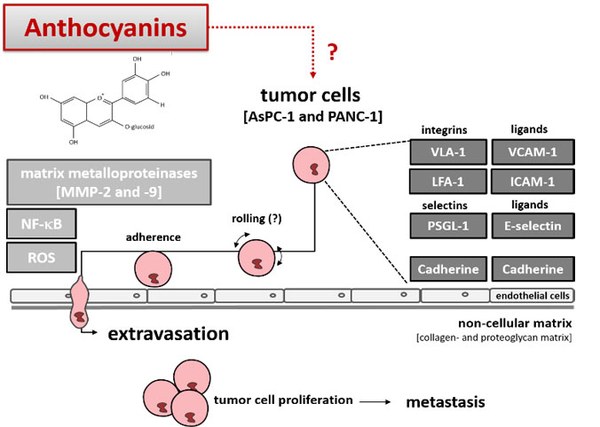Research
Our group studies the influence of nutrients on metabolic disease including obesity and impaired glucose tolerance, as well as on tumor development. A specific focus is on secondary plant compounds. Besides translational studies in probands, cell culture-based and animal experiments are used.
Anti-metastatic potential of anthocyanins and their metabolites (metabotypes) on cancer cell lines with different phenotypes - role of intestinal fermentation and metabolization.
ATTACH- (Anthocyanins target tumor cell adhesion – cancer vs. endothelial cell (HUVEC) interactions) study.
Funded by German Research Foundation (DFG, project number: 415589544, duration 01/2019 – 12/2021, PI: PD Dr. Sabine Kuntz)
Anthocyanins are the most abundant flavonoid constituents of fruits and vegetables and epidemiologic studies suggest that consumption of anthocyanins lowers the risk of cardiovascular disease, diabetes mellitus, arthritis, and cancer. Within this project, we hypothesize that anthocyanins and their metabolites inhibit cancer cell migration, which is a key property of cancer metastasis and inflammation. In order for cancer to spread and disseminate throughout the organism, cancer cells must migrate and invade through extracellular matrix (ECM), intravasate into blood circulation, attach to a distant site, and finally extravasate to form distant foci (Figure 1). Using in vitro transwell migration and invasion assays, the effect of anthocyanins and possible metabolites on processes such as extravasation, cell adhesion molecules (integrins and selectins) and proteolytic enzymes (matrix metalloproteinases (MMP)) are investigated.
The project is performed in cooperation with Silvia Rudloff (JLU Giessen, Institute of Nutritional Science, FB09), Sylvia Schnell (JLU Giessen, Department of Applied Microbiology, FB09), Frank Will (Hochschule Geisenheim University, Department of Beverage Research) and Cristina Andrés-Lacueva (University of Barcelona, Department of Nutrition and Food Science).

Figure 1: Effects of anthocyanins on cancer cell adhesion and migration in an in vitro culture model (the schematic drawings of the cells and organs were obtained from Motifolio Inc. (www.motifolio.com)).
Reference:
Kuntz S, Kunz C, Rudloff S. Inhibition of pancreatic cancer cell migration by plasma anthocyanins isolated from healthy volunteers receiving an anthocyanin-rich berry juice. Eur J Nutr. (2017) 56:203-214. doi: 10.1007/s00394-015-1070-3
